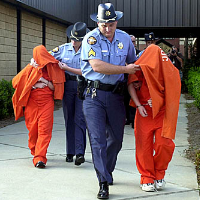Despite Supreme Court Ruling, at least 15 States Still Allow Mandatory Life Sentences for Juveniles

A landmark U.S. Supreme Court ruling last year was supposed to eliminate mandatory life sentences for juveniles who commit murder, saying such punishments were cruel and unusual, and, thus, unconstitutional. But at least 15 states have yet to take action in response to the ruling and have not eliminated mandatory life without parole sentences for those under the age of 18.
Currently, there are more than 2,000 prisoners in 43 states serving life without parole sentences for crimes they committed as juveniles, according to Pew’s Stateline.
Since the Supreme Court’s June 2012 ruling in Miller v. Alabama, 11 states have reexamined their sentencing laws, making juvenile killers eligible for a parole hearing after serving a mandatory minimum sentence of approximately 25 years.
In Michigan alone, more than 300 juvenile lifers will receive a parole hearing as a result of a federal court responding to the Miller decision.
But in many states, lawmakers and the courts have expressed uncertainty over how to apply the Miller case to offenders already serving life sentences. Part of the problem, according to Doug Berman, a law professor at Ohio State University, is that the court’s decision did not apply to all life sentences for juvenile offenders. Instead, each case must be judged individually. It also did not state whether the decision should be applied retroactively, nor did it deal with cases in which a life sentence was given for reasons other than a mandatory sentence law.
“There’s been a dynamic set of reactions, and that reflects that the decision will have different impacts on different jurisdictions,” Berman told Stateline. “In some states where it’s only a couple sentences, the courts are saying ‘OK, we’ll think about resentencing (all prisoners serving juvenile life without parole sentences),’ but in other states where they have lots of these sentences, they’re more resistant.”
In Pennsylvania, which has the largest number of inmates (400) potentially impacted by the ruling, the state Supreme Court has been considering for more than a year whether to apply the decision retroactively.
In five other states (Michigan, Iowa, Illinois, Louisiana and Mississippi), the courts have ruled that the Supreme Court decision applies retroactively to all prisoners serving such sentences.
But in Minnesota and Florida, judges have decided that the ruling only applies to future cases.
-Noel Brinkerhoff
To Learn More:
After Supreme Court Ruling, States Act on Juvenile Sentences (by Maggie Clark, Pew Stateline)
States Dodge Supreme Court Ruling Against Life Sentences for Minors (by Matt Bewig, AllGov)
Supreme Court Hears Cases of 14-Year-Olds Given Life Imprisonment without Parole (by David Wallechinsky and Noel Brinkerhoff, AllGov)
- Top Stories
- Unusual News
- Where is the Money Going?
- Controversies
- U.S. and the World
- Appointments and Resignations
- Latest News
- Musk and Trump Fire Members of Congress
- Trump Calls for Violent Street Demonstrations Against Himself
- Trump Changes Name of Republican Party
- The 2024 Election By the Numbers
- Bashar al-Assad—The Fall of a Rabid AntiSemite






Comments